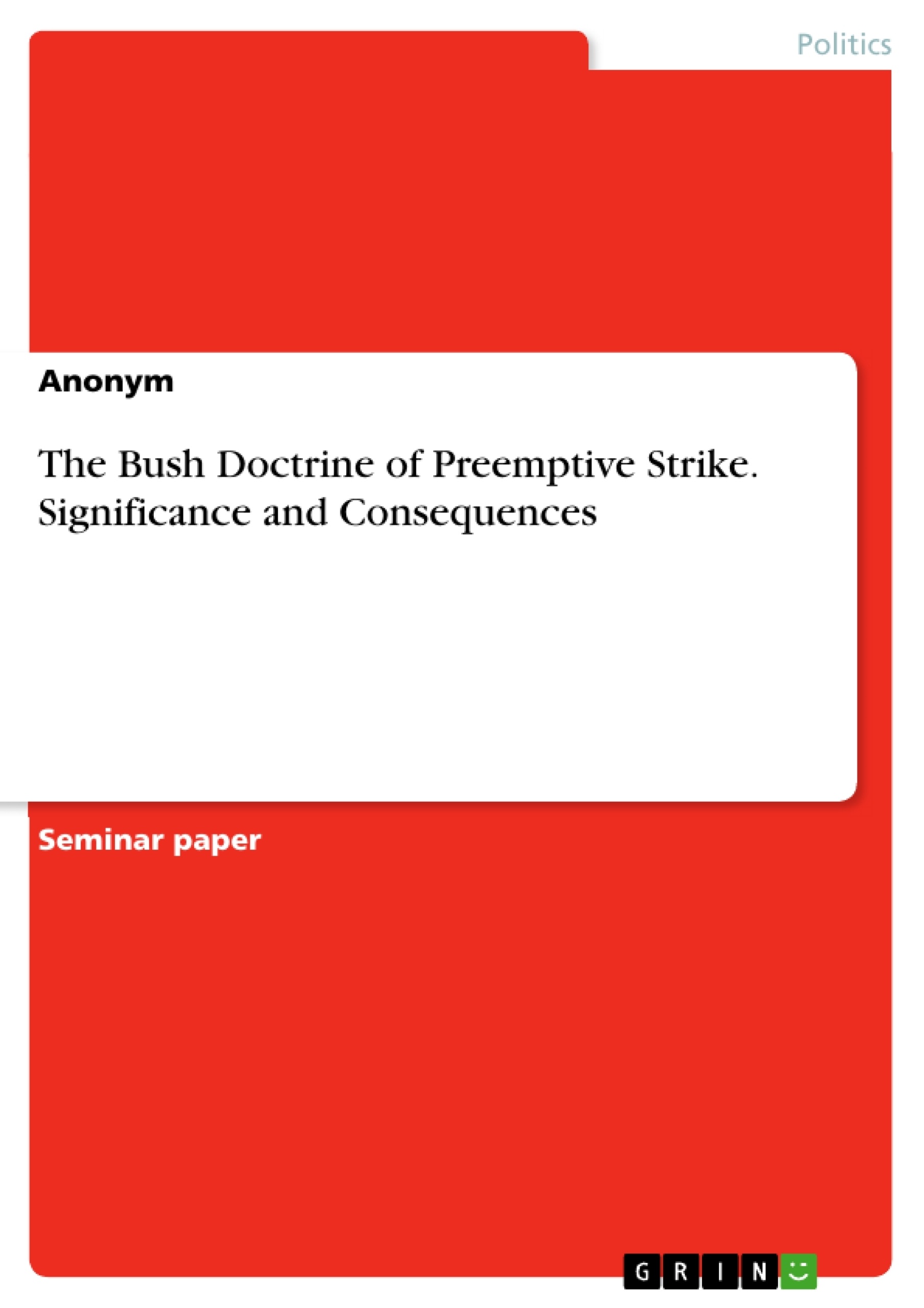With the release of the National Security Strategy (NSS) in September 2002, the
administration of President George W. Bush developed the ideological keystone for U.S.
foreign policy for the beginning of the 21st century. The document is therefore often referred
to as the Bush Doctrine. Its publication, and more so, its application in the American foreign
policy agenda, has caused tensions among politicians, diplomats and citizens all around the
globe. The consequences, however, may be more consequential than just a temporary low in
the international political climate. The Bush Doctrine “[…] affirms the legitimacy of an
American preventive strike and emphasizes the notion that ‘If you are not with us, you are
against us.’ U.S. foreign policy, therefore, is […] about shedding the multilateralism favored
by the Clinton administration and pursuing a more active, unilateral approach” (Glazov
2002, 1).
In the following, I intend to analyze what consequences the U.S. foreign policy
issued in the 2002 NSS has on America itself and on the international community in general
In particular, I will deal with the definition of prevention and preemption and the
Administration’s unilateral approach towards global politics. As both friends and enemies
evaluate the meaning of the 2002 NSS, it becomes evident that great danger might lie in the
ambiguous wording of the Doctrine. The question is now, whether it will prove to be a sound
and effective strategy in the War on Terror or continue to disunite America and its allies, if
its content is not properly clarified and addressed
Inhaltsverzeichnis (Table of Contents)
- Introduction
- The National Security Strategy
- The NSS after the Cold War
- Preemption and Prevention
- Defining the Terms
- Preemption in International Law
- The 2002 National Security Strategy
- The New NSS - An Analysis
- Consequences of the 2002 National Security Strategy
- Consequences for the United States
- Consequences for the International Community
- Conclusion
Zielsetzung und Themenschwerpunkte (Objectives and Key Themes)
This text aims to analyze the consequences of the 2002 National Security Strategy (NSS) for both the United States and the international community. It focuses specifically on the Bush Doctrine's concept of preemption and its implications for U.S. foreign policy.
- The Bush Doctrine's emphasis on preemptive strikes and its deviation from multilateralism.
- The significance of the 2002 NSS in shaping U.S. foreign policy in the 21st century.
- The definitions and interpretations of preemption and prevention in international law and strategic discourse.
- The potential for misunderstanding and misinterpretation of the Bush Doctrine's language.
- The impact of the Bush Doctrine on international relations and the U.S.'s standing among its allies and adversaries.
Zusammenfassung der Kapitel (Chapter Summaries)
- Introduction: The text introduces the Bush Doctrine, which emerged with the 2002 National Security Strategy, as a pivotal document shaping U.S. foreign policy in the early 21st century. It highlights the potential consequences of the Bush Doctrine, including its impact on the international political climate and the ambiguity surrounding its interpretation.
- The National Security Strategy: This section traces the evolution of the NSS, beginning with its institutionalization after World War II and its reorientation following the Cold War. It discusses the shift from multilateralism under President Clinton to a more unilateral approach under President Bush, particularly in response to the September 11th attacks.
- The 2002 National Security Strategy: This chapter focuses on the 2002 NSS, analyzing its content and implications for the United States and the international community. It delves into the concept of preemption and its potential for generating diverse reactions among different actors on the global stage.
Schlüsselwörter (Keywords)
The text centers on the Bush Doctrine, preemption, prevention, unilateralism, and the impact of the 2002 National Security Strategy on U.S. foreign policy. The analysis delves into the potential consequences of the doctrine for the United States and its international relations, highlighting key concepts such as international law, strategic discourse, and the ambiguous nature of the language employed in the doctrine.
Frequently Asked Questions
What is the "Bush Doctrine"?
The Bush Doctrine refers to the foreign policy principles in the 2002 National Security Strategy, emphasizing preemptive strikes and unilateralism in the War on Terror.
What is the difference between preemption and prevention?
The text analyzes these terms in international law, where preemption typically refers to acting against an imminent threat, while prevention involves acting against a potential future threat.
How did U.S. foreign policy shift after the Cold War?
Policy shifted from the multilateralism favored by the Clinton administration to a more active, unilateral approach under George W. Bush after 9/11.
What are the consequences of the 2002 NSS for the international community?
It caused significant tensions among allies and diplomats, potentially disuniting America from its partners due to its "if you are not with us, you are against us" stance.
Why is the wording of the 2002 National Security Strategy considered dangerous?
The text suggests that the ambiguous wording of the Doctrine could lead to misunderstandings and misinterpretations by both friends and enemies.
- Quote paper
- Anonym (Author), 2005, The Bush Doctrine of Preemptive Strike. Significance and Consequences, Munich, GRIN Verlag, https://www.grin.com/document/153862



